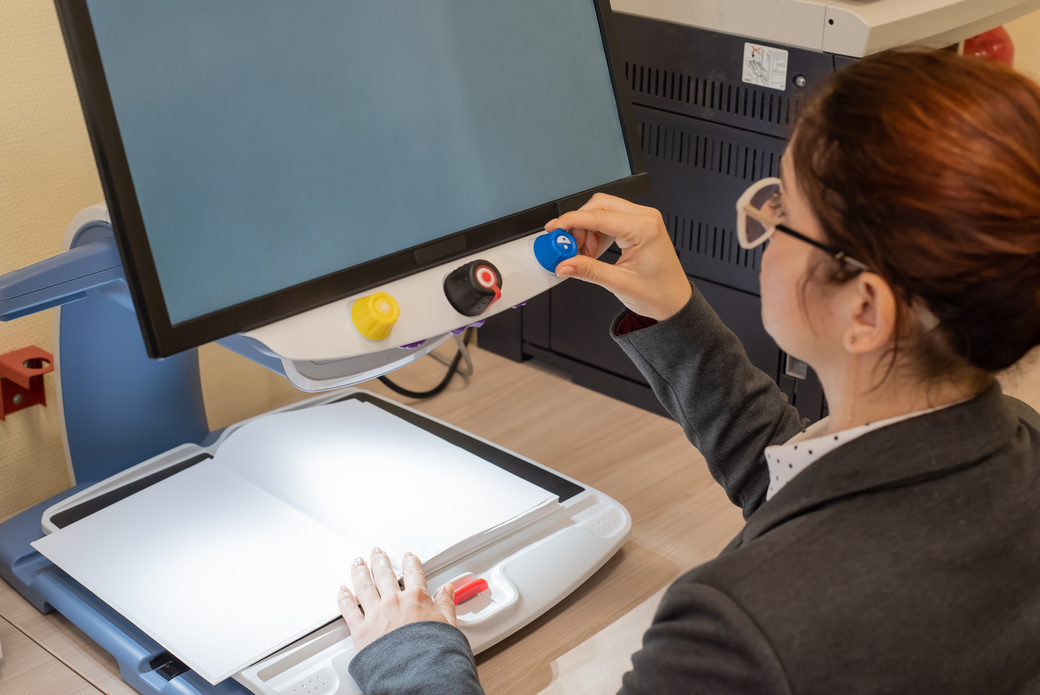Teacher of Students with Visual Impairments (TSVI)
A TSVI is a licensed special education teacher who has received certification and specialized training in meeting the educational needs of students who are blind or have a visual impairment ages birth through 21.
The role of the TSVI is to provide direct and/or consultative special education services specific to vision loss. The TSVI provides support to students, teachers, and parents and also acts as a liaison with community services. The TSVI works with the educational team to ensure that a student with a visual impairment has access to all learning materials and activities in his or her most efficient mode and may provide instruction in assistive technology, braille, independent living skills, and more.
|
|
|
Roles and Responsibilities:
- Has primary responsibility for specialized instruction and services required to meet the unique educational needs of her visually impaired students.
- Possesses the skills and abilities necessary to provide and coordinate this specialized instruction.
- Assists the student, parents, special and regular education personnel, and the student’s sighted peers in
- understanding the unique educational needs and learning characteristics of visually impaired students,
- becoming aware of services and support available from local programs for visually impaired students,
- acquiring information regarding local, state, and national resources for the education of visually impaired students, and
- interpreting the visually impaired student’s specific eye condition, the educational implications of the visual impairment, and the results of functional vision and learning media assessments.
- Consults regularly with the classroom teacher, other regular and special education personnel, parents, and others to coordinate programs and services for the visually impaired student.
- Assists the site administrator and teachers in making environmental adjustments for the student in the school.
- Shares responsibility with classroom teachers in the identification of instructional areas in which the student requires assistance.
- Assures that large-type or braille texts, supplementary materials, educational, aids, and equipment needed by the visually impaired student, and the classroom teacher, are provided in a timely manner to ensure the student’s maximum participation in all classroom activities (appropriate educational materials may be prepared or adapted by the VI teacher, or they may be obtained from educational, clerical, or transcriber services.)
- Provides instruction in the development and maintenance of skills to meet the student’s unique educational needs in the following areas, as indicated in the IEP:
- low vision & visual efficiency skills,
- concept development & academic skills,
- daily living skills,
- career & vocational education skills,
- communication skills (these skills include braille reading and writing as appropriate),
- social/emotional skills and abilities, & sensory motor skills.
- Prepares sequential and meaningful instruction geared to the student’s assessed needs, IEP goals and objectives, functioning, and motivational levels. This instruction should be reflected in weekly or monthly lesson plans, as appropriate.
- Provides assistance to the classroom teacher in academic subjects and activities of the classroom that, as a direct result of the student’s visual impairment, require adaptation for the student.
- Provides initial and ongoing assessment:
- consults with assessment team to determine appropriate testing materials and modifications needed,
- assists with assessments when needed,
- interprets assessment results when needed.
- Conducts functional vision/learning media assessments and produces written reports.
- Attends ARD and IEP meetings for students with visual impairments.
- Schedules time efficiently for assessment, instruction, planning, preparation of materials, travel, and conferences with relevant school and other key individuals.
- Maintains ongoing contact with parents to assist them in the development of a realistic understanding of their child’s abilities, progress, and future goals.
- Provides in-service training programs for school personnel and students and education for parents regarding the needs of visually impaired students and adaptations, programs, and services for these students.
- Makes available pamphlets, films, and other public information materials that may be useful in developing realistic and unprejudiced attitudes toward visually impaired students.
- Coordinates with other personnel, such as transcribers, readers, counselors, O&M specialists, career/vocational education staff, and rehabilitation counselors.
- Maintains a current reference library of professional materials and resources.
- Acquires information and training about current research, development, and technology.
- The Classroom Teacher (regular, special class, or resource specialist has the following roles and responsibilities:
- Provides instruction in appropriate academic and non-academic content areas to the visually impaired student in the classroom.
- Works cooperatively with the teacher of students with visual impairments to
- identify the student’s areas of educational need, including unique education needs,
- coordinate instruction and services to meet these needs,
- provide, in a timely manner, classroom materials that need to be reproduced in another medium,
- determine mutually convenient times during the school day for scheduling the teacher of students with visual impairments to work with the student,
- modify classroom procedures and environment to meet the specific needs of the visually impaired student for participation in classroom activities, and
- exchange information concerning the visually impaired student with parents and other individuals on a regular basis.
Taken from: The Texas School for the Blind and Visually Impaired

